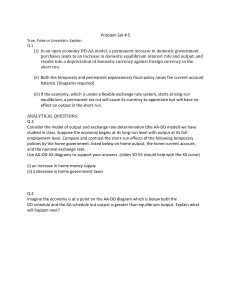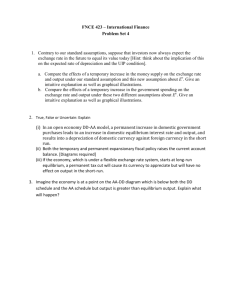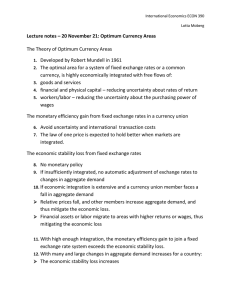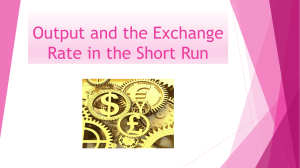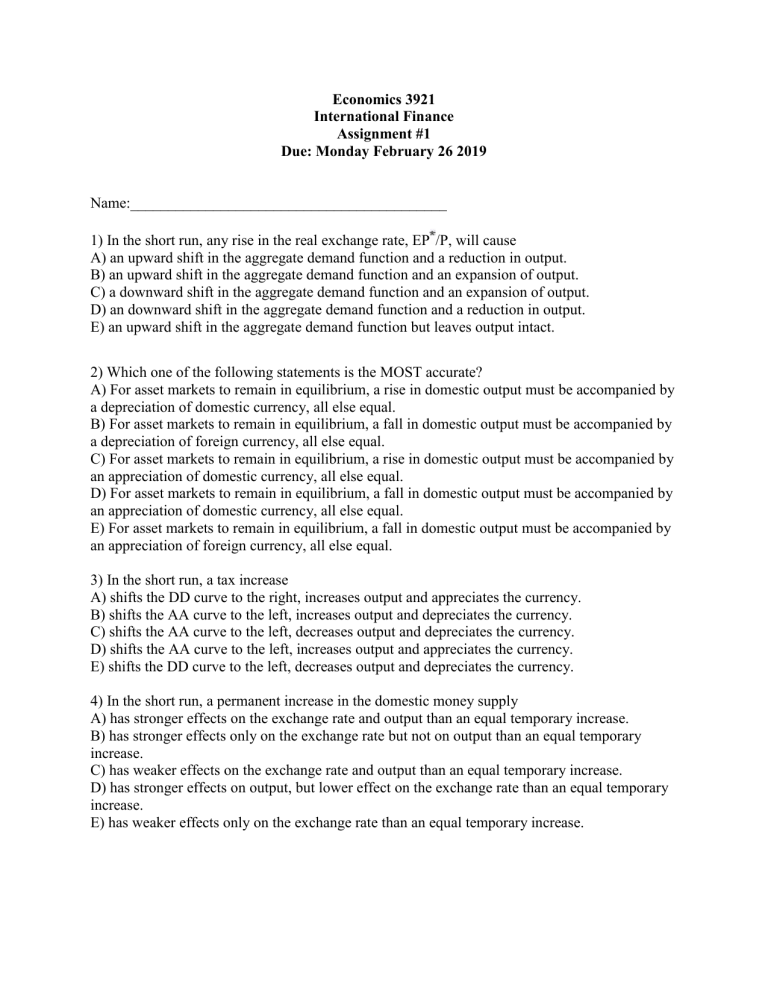
Economics 3921
International Finance
Assignment #1
Due: Monday February 26 2019
Name:__________________________________________
1) In the short run, any rise in the real exchange rate, EP /P, will cause
A) an upward shift in the aggregate demand function and a reduction in output.
B) an upward shift in the aggregate demand function and an expansion of output.
C) a downward shift in the aggregate demand function and an expansion of output.
D) an downward shift in the aggregate demand function and a reduction in output.
E) an upward shift in the aggregate demand function but leaves output intact.
2) Which one of the following statements is the MOST accurate?
A) For asset markets to remain in equilibrium, a rise in domestic output must be accompanied by a depreciation of domestic currency, all else equal.
B) For asset markets to remain in equilibrium, a fall in domestic output must be accompanied by a depreciation of foreign currency, all else equal.
C) For asset markets to remain in equilibrium, a rise in domestic output must be accompanied by an appreciation of domestic currency, all else equal.
D) For asset markets to remain in equilibrium, a fall in domestic output must be accompanied by an appreciation of domestic currency, all else equal.
E) For asset markets to remain in equilibrium, a fall in domestic output must be accompanied by an appreciation of foreign currency, all else equal.
3) In the short run, a tax increase
A) shifts the DD curve to the right, increases output and appreciates the currency.
B) shifts the AA curve to the left, increases output and depreciates the currency.
C) shifts the AA curve to the left, decreases output and depreciates the currency.
D) shifts the AA curve to the left, increases output and appreciates the currency.
E) shifts the DD curve to the left, decreases output and depreciates the currency.
4) In the short run, a permanent increase in the domestic money supply
A) has stronger effects on the exchange rate and output than an equal temporary increase.
B) has stronger effects only on the exchange rate but not on output than an equal temporary increase.
C) has weaker effects on the exchange rate and output than an equal temporary increase.
D) has stronger effects on output, but lower effect on the exchange rate than an equal temporary increase.
E) has weaker effects only on the exchange rate than an equal temporary increase.
5) Which statement best describes the current account balance in the short run?
A) Monetary expansion lowers the current account balance.
B) Monetary expansion keeps the current account balance the same.
C) Fiscal expansion increases the current account balance.
D) Fiscal expansion keeps the current account balance the same.
E) Monetary expansion increases the current account balance.
6) When an economy is in a liquidity trap
A) monetary policy cannot be used to influence the exchange rate.
B) monetary policy can be used to drive interest rates down, but not to drive them up.
C) there is an excess demand for bonds.
D) people and institutions avoid holding cash balances.
E) it can escape only by introducing a hard, or illiquid, currency.
7) Which one of the following statements is the most correct?
A) If central banks are not sterilizing and the home country has a balance of payments surplus, any associated increase in the home central bank's foreign assets implies an increased home money supply.
B) If central banks are not sterilizing and the home country has a balance of payments surplus, any associated increase in the home central bank's foreign assets implies a decreased home money supply.
C) If central banks are not sterilizing and the home country has a balance of payments surplus, any associated increase in the home central bank's foreign assets implies an increased home money demand.
D) If central banks are not sterilizing and the home country has a balance of payments surplus, any associated decrease in the home central bank's foreign assets implies an increased home money supply.
E) If central banks are not sterilizing and the home country has a balance of payments shortage, any associated decrease in the home central bank's foreign assets implies an increased home money supply.
8) Imagine that the economy is at a point on the DD-AA schedule that is above both AA and DD and where both the output and asset markets are out of equilibrium. Explain what will happen next?
